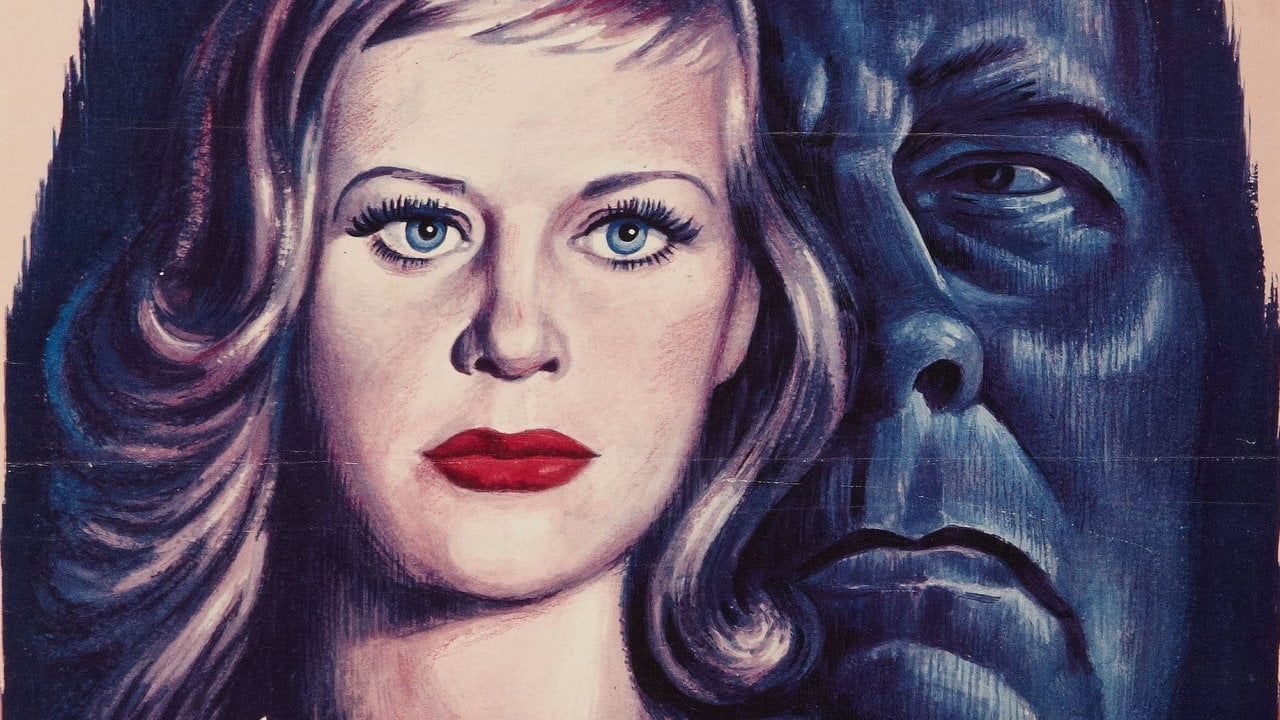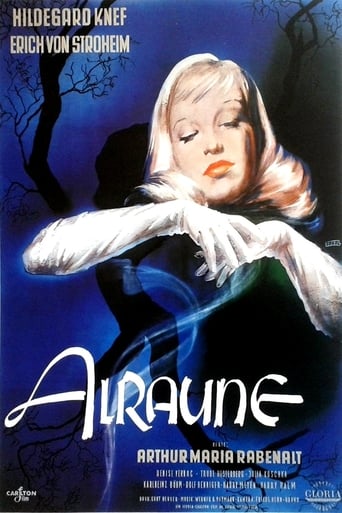

Yawn. Poorly Filmed Snooze Fest.
... View MoreA different way of telling a story
... View MoreThe plot isn't so bad, but the pace of storytelling is too slow which makes people bored. Certain moments are so obvious and unnecessary for the main plot. I would've fast-forwarded those moments if it was an online streaming. The ending looks like implying a sequel, not sure if this movie will get one
... View MoreI think this is a new genre that they're all sort of working their way through it and haven't got all the kinks worked out yet but it's a genre that works for me.
... View MoreA Deutsche Styria Film. English version made by The American Dubbing Co. for Carlton Films. U.S. release through Distributors Corporation of America: 1958. West German release through Gloria: 23 October 1952 (sic). 92 minutes. German title: ALRAUNE. SYNOPSIS: An iconoclastic professor's mysterious but highly attractive daughter has no less than four young men in a spin. NOTES: Fifth remake of the 1911 Hans Heinz Ewers novel. There were three silent versions of which the most famous is the 1928 release with Brigitte Helm and Paul Wegener. Miss Helm starred again in the 1930 remake, this time oppposite Albert Bassermann and a somewhat second-string cast rather stagily directed by Richard Oswald (doubtless hampered by the demands of the sound engineer). 11952 seemed an opportunistic time for a full-scale remake, using a top-of-the-range budget and an impressive cast led by Erich von Stroheim (making his first film appearance after his Hollywood comeback role in Sunset Boulevard), Hildegard Knef (then at the height of her fame-she starred in no less than seven films in 1952), and Karlheinz Bohm (later to play the title role in Peeping Tom).COMMENT: Although this film is only at present available in its English-dubbed version, one must admit that the dubbing, for once, is exceptionally good. The principal dubbers even make laudable attempts to imitate both Knef's and Von Stroheim's voices and their methods of delivery. It's also pleasing that Fraulein Knef's songs have been left to speak for themselves in their original German and that Werner Heymann's most appropriate background music has been retained. Rabenalt is not usually thought of as a classy director, but, helped by the atmospheric sets and photography, he has done wonders here. Extremely fast-clipped film editing keeps the plot moving at a breakneck pace for almost every second of its 92 minutes.
... View MoreI had watched the best-regarded (if still rare) 1928 Silent version of this much-filmed German melodrama with Sci-Fi undertones during a previous Halloween challenge; while I recall precious little of that one at this juncture, having re-read my review of it, I know the remake features a different conclusion – as well as a different method of creation for the titular figure (the more realistic one of artificial insemination here instead of her emanating from the mandrake root, though the plant remains much in evidence throughout even now). Still, offhand, I would say that both films are equally effective – with the lead roles being especially well-filled: Erich von Stroheim and Hildegarde Knef (at her loveliest) in this adaptation replacing Paul Wegener and Brigitte Helm respectively in the earlier movie; leading the supporting cast, however, is Karl Boehm (who would excel in his later genre role in the British-made PEEPING TOM [1959]). As I said, events are not exactly fantastic – indeed, leaning more towards romance in the vein of two other much-filmed and horror-tinged classics, namely "The Picture Of Dorian Gray" and "Trilby" (often filmed as SVENGALI and whose 1954 British version, incidentally, also had Knef as its leading lady!) – but, then, Stroheim does keep a caged ape (which comes to no use other than as an added bizarre touch!) in his laboratory and, in any case, the result is no less stylish for that; all in all, this is ample proof that the Germans did not lose their touch for the Expressionistic with the advent of WWII! The premise, too, of a femme fatale turning the heads of several men, all of whom know one another and naturally fall out over her, is interesting for its distinct film noir trappings – in this case, extending to the rethought doom-laden climax that includes a murder and subsequent execution steeped in irony.
... View MoreThis version of Alraune is largely unremarkable but for another excellent performance by the always-radiant Hildegard Knef. Unambitious cinematography and a slow pace undermine any attempt to build real atmosphere. Most interesting is the film's theme of eugenics and the dangers of science just a few years after the fall of the Third Reich.In some ways, though, the Alraune fable is an inverse of Frankenstein: whereas, in Shelley's tale, science is shown to supersede alchemy, here it is the reverse. Alraune's creator has more in common with Rotwang in the sense that there is a blurring of alchemy and science. It is noteworthy that Brigitte Helm starred as the titular character in the early version of Alraune as well as her more famous role as Maria in Metropolis.This film is recommended to Knef fans and people interested in the Alraune myth. However, as a piece of cinema, it is workmanlike and nothing more.
... View MoreALRAUNE (aka UNNATURAL), is based on the popular Hanns Heinz Ewers novel. This version made in 1952, is the fifth and last version filmed. Many sources state that this film is lost in its English language version, but since the version I saw everyone spoke English, I can assure you they are wrong.This film is unusual, if only for its premise. Erich Von Stroheim plays Ten Brinken, a scientist who has created a women by means of artificial insemination. Ten Brinken used the sperm from a hanged murderer and the egg from a prostitute. Ten Brinken raises the girl (whom he has named Alraune, German for "mandrake") as his daughter, but is convinced because she was created artificially, she will inherit all the unsavory characteristics of her "parents". Only evil will befall all those who may fall in love with her. And tragic circumstances do follow all the men she tries to fall in love with. There is an odd element thrown in which suggests Alraune has supernatural powers. She convinces Ten Brinken to by a worthless parcel of land. She then commands some workers to start digging where they discover a spring whose waters contain healing properties. Ten Brinken and a wealthy woman invest in it but the spring runs dry and Ten Brinken ends up almost financially ruined.Despite the films very adult premise, I could not help thinking that this film has the feel of a film belonging in era much older than the 1950's. The few American critics who reviewed the film when it was released in America in 1957 also noted an old fashioned air fatalism throughout the film. Karl Boehm (later of PEEPING TOM) is convincing as the young man who falls in love with Alraune, despite being aware of her ghastly origin and is the only man Alraune finds true love. Critics said he was to naive and boyish for the part, but I think that was what was right for the role.
... View More